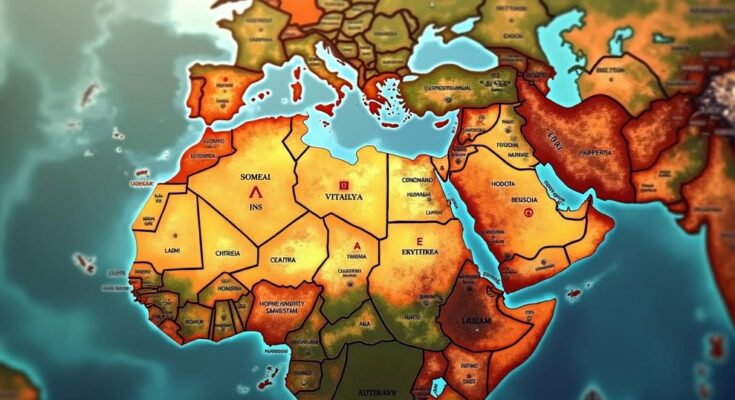Egypt is actively reinforcing its presence in the Horn of Africa through alliances with Somalia and Eritrea, highlighted by a recent summit led by President Abdel Fattah Al-Sisi. This partnership is seen as a strategic counter to Ethiopia, particularly amid ongoing regional tensions following military allegations in Sudan. Egypt’s intent to stabilize and secure its interests in the region reflects broader goals within its foreign policy framework.
Egypt is intensifying its geopolitical presence in the Horn of Africa, culminating in a tripartite summit held in Asmara with the leaders of Eritrea and Somalia. President Abdel Fattah Al-Sisi engaged in discussions with Eritrean President Isaias Afwerki and Somali President Hassan Sheikh Mohamud. This alliance is perceived as a strategic maneuver aimed at enhancing regional influence while simultaneously establishing a counterweight to Ethiopia’s ambitions in the region. This prolific engagement comes on the heels of accusations by Mohamed Hamdan Dagalo, commander of the Rapid Support Forces involved in the Sudan conflict, who alleged that Egyptian forces conducted bombings against his troops. Such allegations underscore Egypt’s military involvement in regional conflicts, marking a significant shift from its previous stance of restraint. The Asmara summit’s agenda, as articulated by Eritrea’s Ministry of Information, ostensibly focused on fostering bilateral relations and addressing regional security challenges. However, analysts speculate the primary objective lies in forming a coalition to exert pressure on Ethiopia amidst an environment characterized by increasing tensions. This strategic alignment appears to correspond with Egypt’s enhanced military cooperation with Somalia, particularly following Ethiopia’s recent agreement with the Somaliland region that involves establishing a naval presence in the southern Red Sea. The visit’s objectives, as stated by the Egyptian presidency, were framed within a narrative of strengthening relations aimed at mutual development and regional stability. Nonetheless, the Ethiopian Prime Minister Abiy Ahmed has voiced concerns about Egypt’s expanding influence, declaring, “We will not allow them to harm us, we will humiliate anyone who dares to threaten us to deter them,” affirming that Ethiopia will not negotiate its sovereignty with external entities. Egypt’s involvement in Sudan, aligning with army leader Abdel Fattah al-Burhan while simultaneously participating in diplomatic efforts to resolve the conflict, further illustrates its ambition to maintain a significant role in African affairs. While accusations have emerged regarding Egypt’s utilization of U.S. military resources in Sudan, Egyptian officials categorically deny any involvement in the ongoing conflict, expressing a commitment to support Sudan’s stability and institutional integrity. Ambassador Hussein Haridi, Egypt’s former deputy foreign minister, emphasized that the nation seeks to end the conflict in Sudan, recognizing that continued instability could yield profound repercussions for Egyptian interests. In contrast, Sudanese political analyst Mohamed Torshin pointed out that Egypt is firmly opposed to any armed groups operating outside governmental authority, reflecting its acute awareness of how such threats could impact national security.
Egypt is strategically bolstering its influence in the Horn of Africa by enhancing diplomatic and military ties with neighboring countries like Somalia and Eritrea, under the leadership of President Abdel Fattah Al-Sisi. The region has been marked by fluctuating power dynamics and rising tensions, particularly concerning Ethiopia’s regional ambitions. Egypt’s actions come in the context of ongoing instability in Sudan, where it has found itself embroiled in military disputes while simultaneously navigating regional and international diplomatic efforts to mediate conflicts. This geopolitical chess game involves balancing relationships while positioning itself as a key player in African affairs, particularly in light of Ethiopia’s recent agreements that could alter trade and military trajectories in the southern Red Sea.
In summary, Egypt’s recent summit with Somalia and Eritrea underlines its determination to augment its geopolitical stature in the Horn of Africa amidst escalating tensions with Ethiopia. This strategic alliance aims to consolidate regional power while addressing immediate security concerns stemming from ongoing conflicts in Sudan. Egypt’s dual approach of military involvement and diplomatic engagement highlights its complex position as it seeks to defend its national interests and exert influence over a region fraught with instability.
Original Source: www.atalayar.com




